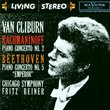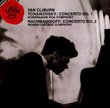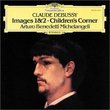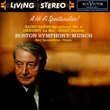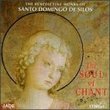| All Artists: Dmitry Shostakovich, Borodin Quartet Title: Dmitry Shostakovich: String Quartet Nos. 2,3,7,8 & 12 Members Wishing: 0 Total Copies: 0 Label: EMI Classics Release Date: 2/1/2000 Genre: Classical Styles: Chamber Music, Historical Periods, Classical (c.1770-1830) Number of Discs: 2 SwapaCD Credits: 2 UPCs: 724356163027, 724356163058 |
Search - Dmitry Shostakovich, Borodin Quartet :: Dmitry Shostakovich: String Quartet Nos. 2,3,7,8 & 12
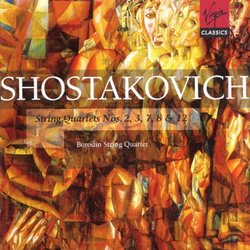 | Dmitry Shostakovich, Borodin Quartet Dmitry Shostakovich: String Quartet Nos. 2,3,7,8 & 12 Genre: Classical
|
Larger Image |
CD DetailsSimilarly Requested CDs
|
CD ReviewsSheer brilliance and range, brilliantly performed R. Hutchinson | a world ruled by fossil fuels and fossil minds | 11/15/2003 (5 out of 5 stars) "These five Shostakovich string quartets were recorded by the Borodin Quartet in London in 1990, and the performance and recording are absolutely brilliant, to match the compositions. (The earlier complete cycle of 15 quartets, recorded in the 1980s by an earlier line-up of the Borodins, is no longer available.) Quartets 2 and 3, which open and close this set, were written respectively in 1944 and 1946, expressions of DSCH in his prime, during the war and its immediate aftermath. They are among his finest works, too rich in mood and style to summarize briefly. The 8th Quartet of 1960 is his best known, and it was publicly dedicated to "the victims of war and fascism." Of course the interpretation of that phrase by the Soviet officials was at variance with what we now know to be DSCH's view. I heard the Kronos Quartet recording (on BLACK ANGELS) before this one (see my review) -- by comparison it is harder-edged, emphasizing the bitter rage at the perpetrators, while the Borodin recording emphasizes grief and quiet desolation. Or in other words, the Kronos recording is strong in the louder passages, while the Borodin recording is more expressive and convincing in the slower, quieter passages, which predominate. The 7th Quartet (also of 1960), in honor of Shostakovich's first wife Nina, who died in 1954, is in three movements, and concludes with a powerful raging allegro. Finally, the 12th Quartet, completed in 1968, is in two movements. It can here be seen to represent the "late quartets," 12-15, all of which are dark works written as Shostakovich's health failed and he was in and out of hospitals. The 12th is a powerful, memorable work that continues to show an amazing range, the baring of a complex soul. Along with the best of Shostakovich's symphonies, his best string quartets are among the finest music of the 20th century, and should be heard by absolutely all music-lovers. Though chronologically later, this is not music that extends the radical innovations of Schoenberg (and Bartok's string quartets). Shostakovich's music is not exactly neo-classical, or neo-romantic, but the modernist elements in his work are integrated seamlessly into a mainly tonal, lyrical conception that makes it more acceptable to the average concert-goer than the music of many of DSCH's contemporaries in the West. Dark and gloomy, yes, but not a radical departure from "the classical tradition."" Beautiful recent recordings by the Borodin Quartet the_drone | 04/16/2000 (5 out of 5 stars) "This 2-CD set contains the 1990 recordings by the Borodin String Quartet of 5 major Shostakovich Quartets for Virgin Classics (now EMI/Virgin Classics). The Borodin String Quartet recorded a complete cycle in Moscow between 1978 and 1983 (originally released in the west as an EMI box set, but now availabe as a BMG/Melodiya box set through Amazon). These beautiful 1990 digital recordings of 5 of the 15 quartets represent the best anthology of the Shostakovich quartets available today and should not be missed. Although the readings are different--less emotional, more meditative--these performances are as intense and committed as the earlier ones and should not be missed, not even by those who own the complete set recorded by the Borodin String Quartet. All the more tempting by the fact that this 2-CD set is offered for less than the price of 1, an incredible bargain!" A PILGRIMAGE DAVID BRYSON | Glossop Derbyshire England | 08/17/2003 (5 out of 5 stars) "This 2-disc selection of 5 Shostakovich quartets is arranged with quartets #2 and #12 on the first disc, #8, #7 and #3 (in that order for some reason) on the second.It seems to me that far and away the best sequence for listening to them is the chronological sequence of publication, which to the best of my knowledge is also the sequence of their composition. Shostakovich's output is a pilgrim's progress. His music tracks his states of mind, and with the quartets we can try to follow those comparatively free from external political influences and the pressing practical need to adopt public and official personae. These quartets have far more unity and consistency of style than do the symphonies and concertos, and it is far easier for the hearer to gain a feel for the composer's real private identity. 3 of the 5 here are in major keys, but the prevailing mood is sombre and introverted in all of them. It almost goes without saying that this is not `absolute' music - the music by itself is not the whole story as it is in the quartets of Borodin or Brahms. The listener needs to read the composer's mind-set as best he can, with or without help from the composer's biography. If anyone wants my advice, it would be to persevere without that for a while, as music of this stature demands to be heard for itself.There are no early works here - the second quartet has the opus-# 68 - and one of the things I like best about them is that they are `genuine' quartets, if that expression may be excused. More or less nobody's quartets consist of absolutely pure four-part writing, but there are cases, even including such great works as Franck's quartet or Schumann's quintet, where the string-writing is really for a miniature string band or orchestra rather than a distinctive quartet. Shostakovich is not afraid to relax the idiom at times, notably in the recitative movement of the second quartet (and why should he be? - neither was Beethoven, neither was Brahms), but fundamentally he is as faithful to the quartet concept as Haydn himself. The recorded sound is excellent without drawing attention to itself in any way, as it does in the Borodins' great disc of Borodin's own quartets. The performances strike me as exemplary in their sympathy and understanding as well as proficiency, and the whole production ranks as what Thucydides called `a possession for ever', meaning by that a thing to be returned to over and over again. It's a classic that will not soon be supplanted."
|

 Track Listings (6) - Disc #1
Track Listings (6) - Disc #1